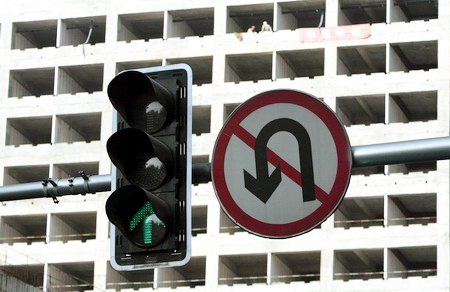Home sales exceeded 6 trillion yuan last year, one-fifth of total gross domestic product
China seems to be caught in a dilemma - while soaring property prices have left millions of people out in the cold and fueled growing concern over an asset bubble, the property sector remains a key economic driver.
To some extent, China's economy has been "kidnapped" by the property industry. It is estimated that the country's property sales, including both pre-owned homes and new apartments, may have exceeded 6 trillion yuan ($879 million) last year, accounting for one fifth of gross domestic product (GDP) during the same period. Property investment may have reached 3.6 trillion yuan, or 19 percent of the country's fixed assets investment.
|

|
|
To turn or not to turn: China faces a dilemma in its policy on housing. There are benefits as well as disbenefits in a booming market. [China Daily]
|
Gu Yunchang, vice-president of China Real Estate Research Association, said at a recent forum that whether in terms of stimulating investment and consumption, the real estate sector plays a decisive role in the economic recovery and boom.
Moreover, land sales are the biggest revenue contributor. According to statistics from the Ministry of Land and Resources, the government netted 1.6 trillion yuan from land sales last year, equal to 40 percent of the nation's two-year stimulus package and 4.7 percent of GDP last year. The sector's sales revenue climbed 63 percent from 2008.
Local governments were the largest beneficiary of this land sales boom, with Hangzhou, Shanghai and Beijing being the top three, according to China Real Estate Index.
This fact also makes the central government's policy to cool down the feverish property sector hard to implement at a local level as it is equal to killing their biggest money-spinner, an even greater problem in a country where GDP is still a leading indicator of the performance of local officials.
For Fan Gang,an economist and member of the monetary policy committee of the central bank, the assets bubble has been one of the most daunting challenges for China. Property prices in China's key cities climbed more than 50 percent last year, making 85 percent of people currently not owning a home unable to afford to buy an apartment, according to a survey by Chinese Academy of Social Sciences.
Therefore, said Fan, the property market needs more institutions and strategies, such as the introduction of a property tax to curb speculative buying.
Meanwhile, the risk of people overstretching themselves financially also rose along with soaring property prices. Wang Zhaoxing, vice-chairman of the China Banking Regulatory Commission, said borrowing to buy property accounts for about 20 percent of new lending in China. In 2009, Chinese banks loaned a record 9.59 trillion yuan. Although Wang said banks' non-performing loans remained at a stable level and even saw a dip at the end of the third quarter of 2009, concern is mounting over the growth of bad loans.
|


